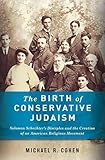The birth of conservative Judaism : Solomon Schechter's disciples and the creation of an American religious movement / Michael R. Cohen.
Material type: TextPublication details: New York : Columbia University Press, ©2012.Description: 1 online resource (ix, 210 pages, 10 unnumbered pages of plates) : illustrationsContent type:
TextPublication details: New York : Columbia University Press, ©2012.Description: 1 online resource (ix, 210 pages, 10 unnumbered pages of plates) : illustrationsContent type: - 9780231526777
- 0231526776
- 296.8/3420973 23
- BM197.5 .C64 2012eb
- online - EBSCO
| Item type | Current library | Call number | URL | Status | Notes | Barcode | |
|---|---|---|---|---|---|---|---|
 eBook
eBook
|
Biblioteca "Angelicum" Pont. Univ. S.Tommaso d'Aquino Nuvola online | online - EBSCO (Browse shelf(Opens below)) | Online access | Not for loan (Accesso limitato) | Accesso per gli utenti autorizzati / Access for authorized users | (ebsco)461153 |
Browsing Biblioteca "Angelicum" Pont. Univ. S.Tommaso d'Aquino shelves, Shelving location: Nuvola online Close shelf browser (Hides shelf browser)
Includes bibliographical references (pages 167-199) and index.
Introduction -- Solomon Schechter and the charismatic bond -- The United Synagogue and the transition to postcharismatic authority -- A "heretic," a "maverick," and the challenge to inclusivity -- On the brink of irrelevance -- The platform of discipleship -- A task left unfinished -- Conclusion: deceptive retrospect and the history of Conservative Judaism -- Epilogue.
Print version record.
Solomon Schechter (1847?1915), the charismatic leader of New York's Jewish Theological Seminary (JTS), came to America in 1902 intent on revitalizing traditional Judaism. While he advocated a return to traditional practices, Schechter articulated no clear position on divisive issues, instead preferring to focus on similarities that could unite American Jewry under a broad message. Michael R. Cohen demonstrates how Schechter, unable to implement his vision on his own, turned to his disciples, rabbinical students and alumni of JTS, to shape his movement. By midcentury, Conservative Judaism.
In English.









